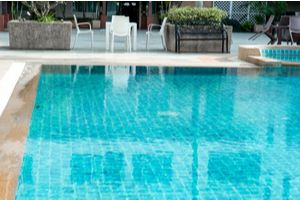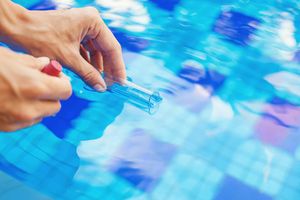When people think of Legionella, they tend to imagine issues that arise in large industrial facilities with poorly maintained machinery like cooling towers. Even small bodies of water can be susceptible to the growth of this harmful bacteria if not managed with care. Pools are no exception. If you own or manage a pool or whirlpool and need advice about proper maintenance and care, it is important to understand what conditions can foster Legionella bacteria growth in pools. Here is more on legionella compliance for pools.
Why Are Pools A Legionella Risk?
Like any standing body of water, pools are at risk of developing bacterial growth. This includes Legionella as well as other bacteria varieties like E. coli. A number of factors could make your pool vulnerable to bacterial growth: the pool water’s temperature, whether or not the pool water is stagnant for extended time periods, and the pool’s location or surrounding environment. Legionella cultures are quick to multiply at temperatures between 68 and 113 degrees Fahrenheit. A pool’s average temperature is typically between 78.8 to 82.4 degrees Fahrenheit-Hot tubs can be slightly hotter but less than 110 degrees. well within the ideal temperature range for Legionella bacteria growth. Pools are used for leisure and exercise, so it is not reasonable to keep them at higher temperatures capable of eliminating Legionella. Some types may be more vulnerable to bacterial growth than other pools; this is often the result of the pool’s construction or certain environmental factors. Evaluate your pool to make notes about its features, design, and environmental context. The better informed you are about your pool’s features, the better informed you will be when making decisions about the pool’s safety and maintenance needs.

Private Above-Ground Pools
Privately owned, above-ground pools are at a greater risk for bacteria and algae buildup. Some above ground pools are little more than basins filled with water. No filtration or pump system exists. This means that above-ground pool water can stagnate and become a bacteria breeding ground. However, above-ground pools under private ownership are used less often than public pools and still cannot be drained when not in use. Responsible maintenance and care are often enough to keep above-ground pools safe from bacteria. It is the owner’s responsibility to observe a rigorous maintenance schedule.
Private In-Ground Pools
In-ground pools located on private property tend to be safer from bacteria than their above-ground counterparts. This comes down to the fact that in-ground pools are built with robust cleaning and filtration systems; furthermore, most in-ground pool owners will at least attempt to comply with the recommended chemical treatment schedule. Pool chemicals like chlorine can kill Legionella, meaning it’s possible to rely on chemical treatments when safeguarding water against bacteria. The one vulnerability of privately owned, outdoor in-ground pools is their exposure to environmental factors. Intense sunlight could overheat pool water to Legionella-ideal temperatures, while natural debris like dead leaves and insects become a food source for growing bacterial organisms. This reinforces the importance of sticking to a regular chemical treatment plan.
Public Pools: Variability And Complexity

In terms of water safety, well-maintained public pools may have an edge. Reputable public pools often use sheltering structures or pool covers to minimize debris, uphold a routine maintenance schedule (including full water changes when necessary), are drained prior to scrubbing the pool’s floor and walls, and undergo rigorous chemical treatments. Not all public pools abide by these standards, so you will need to consider the pool’s particular circumstances and risk factors. Public pools are also busy places. A busier pool means more people using the pool. More people using the pool, in turn, means that public pools are exposed to even more bacteria and bacteria-feeding sources than in a private pool with lower usage. If the public pool is hooked up to the same water system as other equipment, this could introduce bacteria to the pool by accident. Verify if your pool shares its water system with other equipment. If it does, make sure that the other equipment is not contributing bacteria and other contaminants to the water.
 Any pool can be made safe. All pools should be operated with Legionella and other contamination risks in mind. Because Legionella travels via water droplets in the air, whirlpools with aeration and bubbling action can cause these droplets to be inhaled or spread to people who have never been in contact with the the pool. For this reason, Legionella compliance should be a mandatory pool maintenance practice in order to guarantee safety for pool users and anyone who might come in contact with contaminated pool water droplets. What this strategy will look like depends on the type of pool. An expert can help you develop a thorough strategy.
Any pool can be made safe. All pools should be operated with Legionella and other contamination risks in mind. Because Legionella travels via water droplets in the air, whirlpools with aeration and bubbling action can cause these droplets to be inhaled or spread to people who have never been in contact with the the pool. For this reason, Legionella compliance should be a mandatory pool maintenance practice in order to guarantee safety for pool users and anyone who might come in contact with contaminated pool water droplets. What this strategy will look like depends on the type of pool. An expert can help you develop a thorough strategy.
Trust The Experts To Help With You Legionella Compliance
Whether you own a private pool or you are the owner or manager of a public pool, do not hesitate to reach out to the experts for personalized guidance. The professionals at Tower Water would be happy to help you understand your Legionella options and develop a maintenance strategy that will keep your pool safe. Reach out to learn more or to schedule an appointment.
